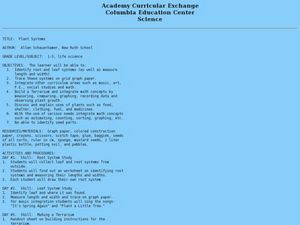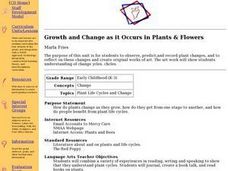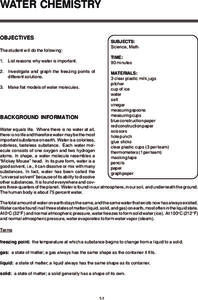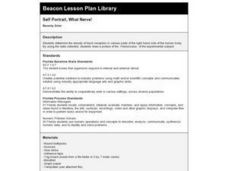Curated OER
DOWNHILL DISCOVERIES
Students studykinetic energy, friction, drag and acceleration by relating it to the Winter Olympics. In this physical properties lesson students create tracks and determine how the course conditions affect bobsled, luge and downhill ski...
Curated OER
Castle Blue Eagle
Sixth graders read the legend of King Arthur. They complete comprehension activities and research life in the Middle Ages. In groups, 6th graders complete several projects including making shields, crowns, and stained glass art designs.
Curated OER
Plant Systems
Pupils examine plant systems. In this life science lesson, students explore leaf and root systems on paper in a terrarium that they design and construct.
Curated OER
Dinosaur Prints
Students examine dinosaur footprints and compare them to the shape of elephant footprints and to the size of their own footprints.
Curated OER
Earthworm Dissection
Students identify the external features of the earthworm. They view a video about different features of an earthworm. They research information about annelids on the Internet. They compare and contrast the earthworm with another annelid.
Curated OER
Strange Attractor
Students explore magnetism. In this magnet lesson plan, students assemble a magnet pendulum. Students observe the pendulum noting the location of the magnetic poles as they construct the pendulum so that the free-swinging magnet comes as...
Curated OER
Growth and Change as it Occurs in Plants and Flowers
Students work together to observe plants and flowers through their life cycle. In groups, they make predictions and record changes in a journal. Using this information, they create their own original artwork and discuss the plants life...
Curated OER
Ramps 2: Ramp Builder
Learners plan, build, and test a ramp that allows objects to roll far. After each group has tested out their ramps, allow them to test their design against the record previously established by the prototype ramp.
Curated OER
Rattle Your Bones and Flex Your Muscles
Third graders identify bones, muscles and joints. They explore and investigate the interaction between bones, muscles and joints, and movement of the hand or foot. To help the teacher provides a poster of the human skeleton.
Curated OER
WATER CHEMISTRY
Students list reasons why water is important and investigate and graph the freezing points of different solutions.
Curated OER
Fun with Food: Hola Jalapeno
Students engage in an at-home instructional activity on language. It contains components that address Adult Education/ESOL, and age appropriate activities for Toddler, Preschool and School aged Students. Adults reinforce steps to prepare...
Curated OER
The Little Blue Engine
Students listen to a read aloud of Shel Silverstein's, The Little Blue Engine. They design and build a Lego train that climbs a three foot incline, one foot at a time. They draw and write about their design.
Curated OER
Eek, It leaks!
Young scholars construct model landfill liners out of two-inch strips of garbage bags within resource constraints. The challenge is to construct a bag that will hold one cup of water without leaking. This represents similar challenges...
Curated OER
Newton's Third Law of Motion
Learners move through five stations demonstrating Newton's Third Law of Motion. In this Newtonian physics instructional activity, students watch as the instructor uses a firecracker to demonstrate action and reaction. The learners travel...
Alabama Learning Exchange
What Color Are The Leaves?
Young scholars identify the colors in leaves. In this chromatography instructional activity, students read the book Why Do Leaves Change Color? and construct chromatography strips to identify the colors of leaves.
Curated OER
Data Habitats
Students develop data acquisition skills and quantify descriptive data. In this data lesson students divide into groups and do an activity that shows them why it is important to record data with accuracy and consistency.
Curated OER
Lung Limit
Students determine their lung capacity by completing a science experiment with a bottle of water. In this lung science activity, students discuss the lungs' purpose. Students complete an experiment to determine their lung capacity using...
Curated OER
A Seed Grows
Second graders begin the lesson by planting their own bean seed. Individually, they make predictions about how many leaves and roots their plant might grow and each day record their observations. They graph the results of the length of...
Curated OER
Self Portrait, What Nerve!
Students conduct an experiment to determine the distance between touch receptor fields in parts of the right-hand side of the body. They enter data into the data table.
Curated OER
Oxygen: What a Gas!
Eighth graders explain how oxygen reacts to other elements. They also explain why oxygen is a reactive substance, how it has weight, and how it reacts with other substances. They construct an experiment to relate their findings.
Curated OER
LESSON 5: Jackie Joyner-Kersee
Pupils explore Jackie Jooyner-Kersee and how she's a motivator for people both as an athlete and a philanthropist.
Curated OER
Lightning It's Shocking, It's Frightening, It's Lightning!
Third graders decide what they want to explore lightning, how to go about finding the answers, and deciding what skills they need to further study some of their questions.























